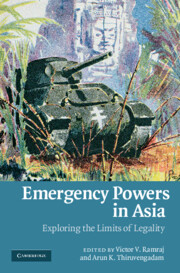Book contents
- Frontmatter
- Contents
- List of contributors
- Preface
- 1 Introduction: emergency powers and constitutionalism in Asia
- PART I Perspectives from legal and political theory
- 2 The emergency powers paradox
- 3 Emergency powers, constitutionalism and legal transplants: the East Asian experience
- 4 Constitution and ‘extraconstitution’: colonial emergency regimes in postcolonial India and Pakistan
- 5 The princely impostor: stories of law and pathology in the exercise of emergency powers
- PART II Postcolonial and post-conflict transitions
- PART III Emergencies, executive power and constitutional order
- PART IV The role of the courts
- Index
- References
3 - Emergency powers, constitutionalism and legal transplants: the East Asian experience
from PART I - Perspectives from legal and political theory
Published online by Cambridge University Press: 04 August 2010
- Frontmatter
- Contents
- List of contributors
- Preface
- 1 Introduction: emergency powers and constitutionalism in Asia
- PART I Perspectives from legal and political theory
- 2 The emergency powers paradox
- 3 Emergency powers, constitutionalism and legal transplants: the East Asian experience
- 4 Constitution and ‘extraconstitution’: colonial emergency regimes in postcolonial India and Pakistan
- 5 The princely impostor: stories of law and pathology in the exercise of emergency powers
- PART II Postcolonial and post-conflict transitions
- PART III Emergencies, executive power and constitutional order
- PART IV The role of the courts
- Index
- References
Summary
Introduction
The concepts of emergency powers and the state of siege are the products of the modern age of constitutionalism, although the idea of ‘constitutional dictatorship’ can be traced back to republican Rome. With the spread of constitutionalism from Europe and North America to all continents of the world, the theory, discourse, constitutional and legal texts and practice of emergency powers were also transplanted all over the world. In the post-9/11 world, theoretical debates on the relationship between emergency powers and liberal constitutional democracy or the rule of law have reached a new climax. Thus in Law in Times of Crisis, Gross and Ní Aoláin wrote about ‘a tension of “tragic dimensions” between democratic values and responses to violent emergencies’.
Yet in the world today, most countries are not long-established or well-established liberal constitutional democratic states. There are fragile postcolonial states, weak democracies, authoritarian states, one-party states, military dictatorships, communist states, facade democracies, quasi-democracies, and so on. All of them have written constitutions, and most of them have constitutional or statutory provisions on states of emergency or emergency powers. Provisions on states of emergency are frequently invoked in the non-Western world or Third World, much more so than in Western liberal constitutional democracies. Actually, in these non-Western states, the ‘tragedy’ lies not so much in the possible conflict between the exigencies of emergency and liberal constitutional democratic or rule-of-law values, but rather in the difficulties of and obstacles to the building of a liberal constitutional democratic state based on the rule of law, and in the circumstances of ‘emergency’ that contribute to such difficulties or constitute such obstacles.
- Type
- Chapter
- Information
- Emergency Powers in AsiaExploring the Limits of Legality, pp. 56 - 88Publisher: Cambridge University PressPrint publication year: 2009
References
- 2
- Cited by



